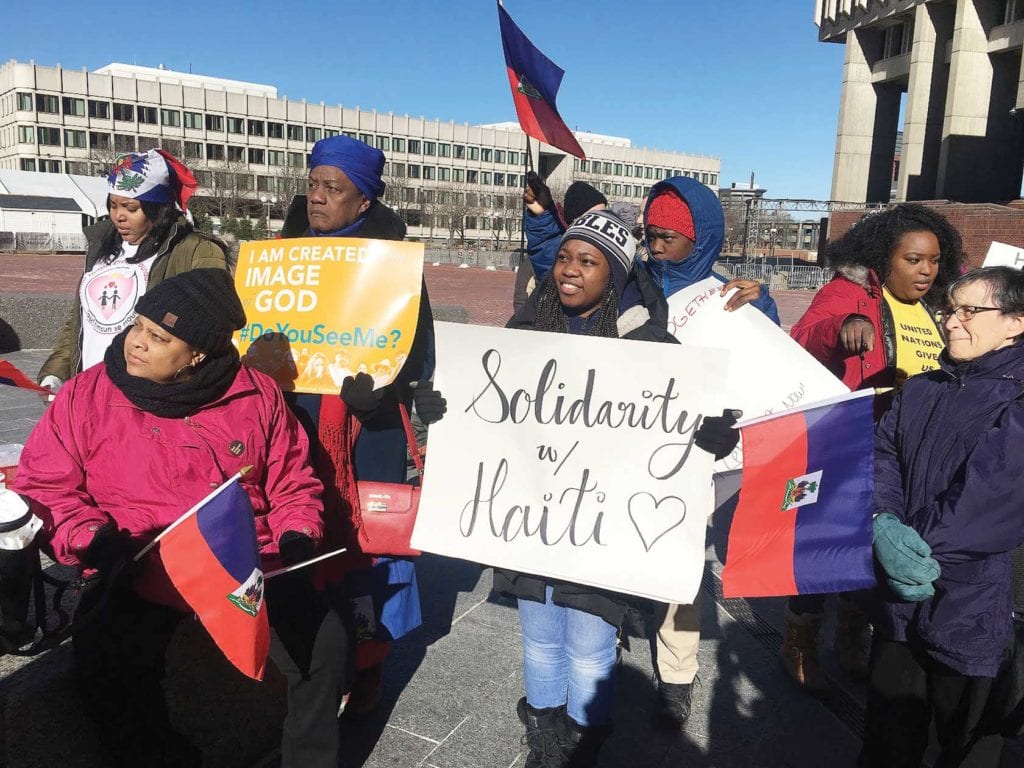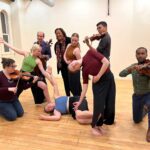Haitians face uncertainty with end to TPS
Trump administration’s push to end program affects thousands

Mona Pompilous flung her car door open as she felt the I-93 bridge to Boston shake underneath her while stopped in traffic. She stepped out of her car, looked around and realized other drivers remained calm behind their steering wheel. Traumatic memories from Haiti’s devastating 2010 earthquake flooded her mind. Before this day, Pompilous thought she had healed, after years of attending therapy sessions.
Flustered, Pompilous returned to the driver’s seat of her car and sat in standstill traffic for nearly an hour as she tried to reassure herself that everything was going to be OK and that cars moving driving on the road below her caused the overpass to shake, not a tectonic shift.
Pompilous came to the United States with her 6-year-old son in 2010, two months after the earthquake displaced one-third of Haiti’s population and killed an estimated 300,000 people. But after nearly a decade of living in the United States, Pompilous doesn’t know when she will have to move on to another country, given her and her now 16-year-old son’s Temporary Protected Status, which gives immigrants the ability to remain and work in the U.S. if war or an environmental disaster made their country uninhabitable. The Trump administration in 2018 announced plans to end TPS for immigrants from several countries, including Haiti. For about 400,000 immigrants from Haiti and other countries, the lives they have built in the United States remain in limbo.
The Earthquake, 2010
On January 12, 2010, Pompilous walked into a school, still wearing her blue-and-white uniform from work earlier that day, expecting to watch her 15-year-old niece perform a ballet recital. She felt the building rattle. People around her lost their balance and fell to the floor. Once out of the building, she forced her way back to her car and put the keys in the ignition.
She dodged cars driving the opposite direction on a one-way street, trucks carrying piles of dismembered and bloody bodies and people walking through the rubble trying to make sense of what had happened to their homes and families.
It usually takes seven minutes for Pompilous to get home to Guvenat, a “pretty town on a hill,” she said. But she couldn’t recall how long it took on this day to find out whether or not her six-year-old son and her sister, who had volunteered to look after him that day, were injured, or worse.
Her son and sister were uninjured and safe in her one-floor home, which was still standing. The earthquake smashed her television, dishes, and glasses into pieces, and a garden in her backyard, where she would tend to edible plants like cherries, plantains, and passionfruit — or grenadia in Pompilous’ native tongue, French — was destroyed.
Pompilous felt lucky that the earthquake didn’t completely destroy her home. She provided shelter, food, and water to dozens of strangers for two months after the disaster before she decided to leave for the U.S. with her son. She said assistance or emergency supplies never came through her town.
“My son was in shock. We had to change him every hour because he kept peeing himself,” she said.
Her friend, a Haitian immigrant living in Boston at the time, called Pompilous and told her she needed to come to America right away because Haiti was no longer safe for her and her son. Pompilous listened, booked a flight and packed one suitcase for the both of them. With a valid visa, she was able to enter the U.S. She said she still doesn’t know all of the people she lost during the earthquake.
Forging a life in America, 2010-2019
After moving seven different times and sharing a bed with her son for five years, Pompilous was finally able to get approved to rent a house in southern Massachusetts. She now works as a case manager for an agency that provides assistance to people and children with disabilities. Many of her cases are for people of Haitian descent.
Stability remains elusive, though. In 2018, President Donald Trump said he would end Temporary Protected Status for people from Haiti and several other countries.
TPS for Haitians was scheduled to expire in July 2019, but the U.S. government has extended it through Jan. 2, 2020 after the order was blocked in court by a string of lawsuits alleging that conditions in the Caribbean country are still unsafe and that Trump’s decision to remove Haitians’ TPS benefits was rooted in racism.
“After the earthquake, there was a lot of movement around making sure that if an earthquake happened like this again that we should be prepared,” said Geralde Gabeau, executive director and founder of the Boston-based Immigrant Family Services Institute. “But unfortunately with Haiti being a poor country, with almost non-existent resources, most of the houses are built the same. Just over this weekend in the southern part of Haiti there was a movement and a few houses started to crumble.”
Pompilous described the unrelenting stress of uncertainty.
“It’s always fresh in my mind. We never have time to process or heal until we come here. Even though they granted TPS, we never really rest because every year you have to worry about what’s going to happen,” she said. “It has been very hard on my community. They had difficulty finding a job, their driver’s licenses would expire, and managers asked them to leave.”
Current affairs in Haiti
Haiti is the poorest country in the western hemisphere, according to the CIA World Factbook. Close to 60 percent of the country’s 11 million people live under the national poverty line earning less than $2 a day, and 25 percent make less than $1 a day.
Gabeau said that in 1998, when she lived in her native Haiti, she was threatened by gang members who stormed into her living room with guns as she gripped her 6-month-old daughter in her arms. She doesn’t know why they came to her home that day. It seemed as though they only came to scare her community.
Gabeau was lucky. Her parents resided in Boston at the time and sponsored her to receive a green card. She is now a U.S. citizen. But for about 46,000 other Haitians, who received TPS protection after being displaced by the earthquake, the ability to legally live and work in the U.S. will expire in a matter of months. With her Immigrant Family Services Institute, Gabeau is fighting for their safety in the Greater Boston area. Boston has the third-largest Haitian population in the country.
Much of Haiti’s current infrastructure is insufficient to support large-scale resettlement. According to a study conducted by Donald J. Patterson, an associate professor at the University of California and Westmont College, Haiti suffers from the “inability of political/social infrastructures to be able to maintain high-availability, high-capacity services,” meaning basic necessities like energy, including electricity and fuel, are unavailable to support large-scale advancements.
According to the Department of Homeland Security in its designation of Haiti as a country eligible for TPS, the infrastructure of the country had been “severely damaged,” including its “capacity for the provision of electricity, water, and telephone service” following the 2010 earthquake.
Dieufort Fleurissaint runs a faith-based charitable organization that advocates for education, housing, immigration, health and economic development within the Haitian community in Boston. He said Haiti, along with other countries, is still not prepared to receive an influx of people.
“There are many, many problems that those countries were facing, so therefore they were not in position of receiving their citizens,” he said, “and the [Trump] administration went ahead and canceled TPS for those countries based on political interests.”
Haiti is facing political instability, too. Thousands of Haitians took to the streets in early October demanding the removal of Haitian President Jovenel Moïse. Unlike earlier protests, this one took place without violence or rioting, according to The Miami Herald.
Kayla Degala-Paraiso, a community organizer for the Matahari Women Workers’ Center, works directly with Haitian TPS-holders in Boston. She and her colleagues organize immigrant working women to end gender-based violence and exploitation.
Degala-Paraiso said Boston’s large Haitian community has helped some of the TPS holders to integrate into the city.
“They aren’t just floating around all over Boston — but they don’t have the sense of belonging that they are entitled to,” she said.
Personal connections to the disaster
Gabeau’s husband, who is also from Haiti, delivered emergency medical supplies such as adhesive bandages, cotton, and alcohol pads the week after the earthquake occurred. Gabeau flew down two months later to do the same thing.
“When people heard about the impact of the earthquake, they came and asked me, ‘What can we do?’ At that time it was very hard for people to find food and all of those supplies that people really need ASAP,” Gabeau said. “Even when you go months after, you could still feel the horrible pain, the horrible misery that happened there. I lost a lot of people that I knew. It was one of the most devastating things that you can think. Wherever you go, you run into people and the first thing that they stop to tell you is to give you a list of the people who are gone.”
Gabeau lost a colleague — a mother of two children — along with 19 others ,who were only in their 20s, when the office building they were meeting in collapsed.
“It’s going to be 2020, almost 10 years, and we are still not at a level of being ready for anything. We are fighting very hard for them not to go back.” Gabeau said. “Most of them have lost family members, they have lost their house, they lost everything that they had. So when they came here, they came here to find some type of relief. They started to rebuild their lives, so essentially they don’t have anything left to go back to.”
The fight to keep TPS holders in the U.S.
On the forefront of the fight to keep Haitians in the United States is Jose Palma. Palma travels to different states as the coordinator for the National TPS Alliance to help TPS recipients organize in the fight for their uncertain future. He testifies in court cases blocking the termination by sharing his own story as a TPS recipient from El Salvador, and the stories he has gathered in his work.
Palma said he is currently getting people to lobby members of Congress to pass legislation that would provide permanent residency to everyone protected by TPS.
“What happened with TPS is tricky, because you always know it’s temporary, but you never know when it’s going to end,” Palma said. “It has been always the hope that previous TPS communities eventually became permanent residents. TPS is not just a document that impacts TPS recipients; it’s a document that impacts the whole family.”
According to the Center for American Progress, 620,000 individuals live in a household with a family member that TPS protects. That number includes 448,000 U.S. citizens, 279,000 of whom are U.S.-citizen children under the age of 18. If TPS were to end, it would mean separating these families.
“Things [in Haiti] have not progressed in any shape or form,” Gabeau said. “As a matter of fact, every single week and month, it’s always bad news for Haiti. So, in terms of sending people back to Haiti, the question that I always ask is, send them back to what?”
Stephanie Purifoy and Chris Van Buskirk contributed to this report.

![Banner [Virtual] Art Gallery](https://baystatebanner.com/wp-content/uploads/2024/04/NJ-H_1-150x150.jpg)




